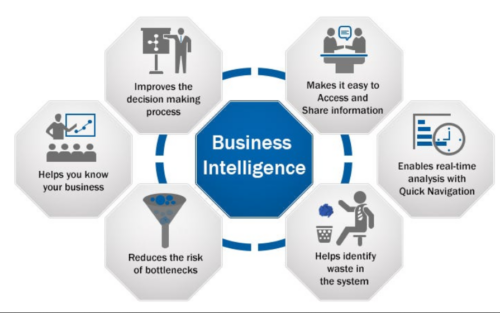Introduction to Business Intelligence (BI) – Business Intelligence (BI) refers to technologies, applications, and practices for the collection, integration, analysis, and presentation of business information. In today’s fast-paced and data-driven business environment, BI plays a crucial role in helping organizations make informed decisions.
Business Intelligence Applications
Types of Business Intelligence Applications
Reporting and Analytics
Reporting and analytics tools enable businesses to gather data from various sources, analyze it, and generate reports to support decision-making processes.
Data Mining
Data mining involves discovering patterns and insights from large datasets to uncover hidden trends, correlations, and relationships.
Data Visualization
Data visualization tools transform raw data into interactive charts, graphs, and dashboards, making it easier for users to understand and interpret complex information.
Dashboards and Scorecards
Dashboards and scorecards provide real-time insights into key performance indicators (KPIs) and metrics, allowing businesses to monitor performance and track progress towards goals.
Benefits of Business Intelligence Applications
Improved Decision Making
By providing access to timely and relevant data, BI applications empower decision-makers to make data-driven decisions quickly and confidently.
Enhanced Operational Efficiency
BI tools streamline business processes, automate repetitive tasks, and identify areas for improvement, leading to increased efficiency and productivity.
Competitive Advantage
Businesses that leverage BI gain a competitive edge by staying ahead of market trends, identifying new opportunities, and responding to changes in the business environment effectively.
Customer Insights
BI applications enable businesses to analyze customer behavior, preferences, and feedback, allowing them to tailor products, services, and marketing strategies to meet customer needs more effectively.
Key Features of Business Intelligence Applications
Data Integration
BI applications consolidate data from disparate sources, such as databases, spreadsheets, and cloud services, into a single, unified view for analysis.
Predictive Analytics
Predictive analytics tools use statistical algorithms and machine learning techniques to forecast future trends, identify patterns, and anticipate customer behavior.
Real-time Reporting
BI applications provide real-time access to critical business information, allowing users to monitor performance and respond to changes promptly.
Scalability
Scalability is a key feature of BI applications, allowing businesses to handle growing volumes of data and users without compromising performance.
Popular Business Intelligence Tools
Tableau
Tableau is a leading data visualization and analytics platform known for its intuitive interface and powerful capabilities for exploring and sharing insights.
Microsoft Power BI
Microsoft Power BI is a cloud-based business analytics service that enables users to visualize and analyze data, share insights, and collaborate in real-time.
QlikView
QlikView is a self-service BI platform that allows users to create interactive dashboards, reports, and visualizations from multiple data sources.
IBM Cognos
IBM Cognos is a comprehensive BI and performance management solution that provides capabilities for reporting, analysis, dashboarding, and scorecarding.
Implementing Business Intelligence Applications
Data Collection and Integration
The first step in implementing BI applications is to identify and gather relevant data from various sources, such as internal systems, external databases, and third-party sources.
Analysis and Interpretation
Once the data is collected, it needs to be processed, analyzed, and interpreted to extract actionable insights and meaningful patterns.
Visualization and Reporting
The next step is to present the analyzed data in a clear and visually appealing format, such as charts, graphs, and dashboards, to facilitate decision-making.
Continuous Improvement
BI implementation is an ongoing process that requires continuous monitoring, evaluation, and optimization to ensure that the system meets the evolving needs of the business.
Challenges in Business Intelligence Implementation
Data Quality Issues
Poor data quality, inconsistency, and inaccuracies can undermine the effectiveness of BI applications and lead to unreliable insights and decisions.
Security Concerns
BI applications often deal with sensitive business information, making data security and privacy a top priority for organizations.
User Adoption
Resistance to change, lack of training, and usability issues can hinder user adoption of BI applications, limiting their impact on business performance.
Future Trends in Business Intelligence
Artificial Intelligence Integration
The integration of artificial intelligence (AI) and machine learning (ML) technologies into BI applications will enable more advanced analytics, predictive modeling, and automation capabilities.
Augmented Analytics
Augmented analytics tools leverage AI and ML algorithms to automate data preparation, analysis, and insights generation, empowering business users with self-service analytics capabilities.
Embedded BI
Embedded BI refers to the integration of BI functionality directly into business applications, allowing users to access insights and analytics within the context of their daily workflows.
Conclusion
Business Intelligence applications play a vital role in helping organizations leverage data to gain insights, make informed decisions, and drive business growth. By implementing BI solutions effectively, businesses can improve operational efficiency, gain a competitive advantage, and stay ahead in today’s dynamic business environment.
FAQs
What is the role of business intelligence in today’s business landscape?
Business intelligence helps organizations leverage data to gain insights, make informed decisions, and drive business growth in today’s competitive landscape.
How can businesses benefit from implementing BI applications?
BI applications enable businesses to improve decision-making, enhance operational efficiency, gain a competitive advantage, and gain valuable insights into customer behavior.
What are some popular BI tools available in the market?
Some popular BI tools include Tableau, Microsoft Power BI, QlikView, and IBM Cognos.
What challenges do businesses face in implementing BI?
Businesses may face challenges such as data quality issues, security concerns, and user adoption issues when implementing BI applications.
What can we expect in the future of business intelligence?
The future of business intelligence is expected to be characterized by the integration of artificial intelligence, augmented analytics, and embedded BI capabilities, enabling more advanced analytics, automation, and insights generation.
Pcode Show:



